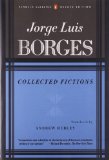
The Argentinian Jorge Luis Borges is my absolute favorite fantasy writer, despite not writing a single story that is classified as part of that genre. A master of the very short story whose career spanned from the 1930s to the 1980s, Borges wrote stories of labyrinths, dreams, Gnosticism, mirrors, duels, libraries, luck and death, tigers, and the question of identity. In a typical three to five page story, Borges packs in as much as Umberto Eco does in several hundred.
Borges experimented with a dazzling variety of genres (even a foray into the Lovecraftian or guacho stories that seem to echo some of Robert E. Howard’s westerns), combining Poirrot with Gnostic occultism, the 47 Ronin with the improbable imposter Tom Castro. reviews of fictional books, world creation, fictionalized treatments of historical figures and events, obscure heresies and secret societies, and just so much more. This is raw fantasy – ideas bubbling out from the unconscious and then playfully explored.
Just a few random stories to give an idea of the diversity of Borges’ writings (and not necessarily even highlights):
The Widow Ching – Pirate: A fictionalized treatment of one of the greatest pirate captains of all time – the widow Ching Shih, who at her height is said to have commanded 600 junks and 40,000 men.
Hakim, the Masked Dyer of Merv: Another fictionalized treatment, this time of the heresiarch Prophet, Hakim the Veiled Prophet of Khorasan (who would make a great Irensavalist leader in Fronela).
The Garden of Forking Paths – Borges and Joyce are often credited as the heralds of hypertext. This story includes a German secret agent, a Sinologist, the infinite labyrinth of Ts’ui Pên, and a novel where all possible outcomes of an event occur simultaneously, each one itself leading to further proliferations of possibilities. Far shorter, and far more readable than Joyce’s entry in the hypertext competition.
Funes, His Memory – the story of a man who remembers ABSOLUTELY everything and as a result loses the need (and perhaps the ability) for generalizations. Absurd counting systems (Funes gives every number up to 24,000 its own unique name) and artificial languages (Funes experiments with a language where EVERYTHING is given a unique name; he discards it because it does not take into account that everything changes with Time) are among the idea experiments.
Death and the Compass – a Swedish Poirrot (in Buenos Aires, not London) deduces that the secret to solving the murder of a rabbi lies in the Tetragrammaton – the unspeakable name of God. The story of the detective who solves a case by imposing (an ultimately incorrect) pattern is later taken up by Umberto Eco in Name of the Rose, but Borges does it in 9 pages.
And there are more than 90 more stories in “Collected Fictions“. So what does any of this have to do with Glorantha? Glorantha is a place where we can play around with ideas about myth, about identity, of we limited beings (limited by Time, by language, by mortality, etc) think of the infinite, along with having adventure stories about mercenaries, pirates, duelists, and outlaws (all staples in Borges’ stories). Borges’ fantasies proved invaluable to me as I explored Glorantha in the Guide to Glorantha, and there’s more than one cult or philosophical movement that fears mirrors or worries about labyrinths.
“Collected Fictions” is all of Borges’ fictional stories collected into one volume and translated into English by Andrew Hurley. My Spanish is not good enough to read Borges in the original, but Hurley’s English is wry, succinct, and wonderfully erudite.
Looking for other readings? Go over to Gloranthan Readings and check out what else we’ve got up.
